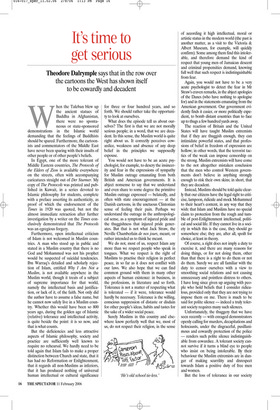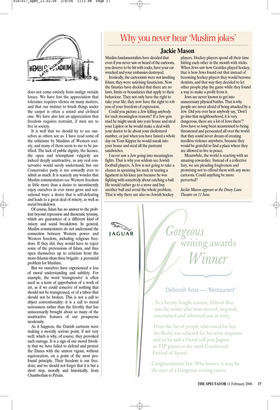It’s time to get serious
Theodore Dalrymple says that in the row over the cartoons the West has shown itself to be cowardly and decadent When the Taleban blew up the ancient statues of Buddha in Afghanistan, there were no spontaneous or state-sponsored demonstrations in the Islamic world demanding that the feelings of Buddhists should be spared. Furthermore, the cartoonists and commentators of the Middle East have never been sparing with their insults of other people or of other people’s beliefs.
In Egypt, one of the more tolerant of Middle Eastern countries, The Protocols of the Elders of Zion is available everywhere on the streets, often with accompanying caricatures straight out of Der Sturmer. My copy of The Protocols was printed and published in Kuwait, in a series devoted to Islamic philosophy for students, complete with a preface asserting its authenticity, as proof of which the endorsement of the Times in 1920 was quoted, but not the almost immediate retraction after further investigation by a writer on the Times conclusively demonstrated that The Protocols was an egregious forgery.
Furthermore, open intellectual criticism of Islam is not welcomed in Muslim countries. A man who stood up in public and stated in a Muslim country that there is no God and Mohammed was not his prophet would be suspected of suicidal tendencies. Ibn Warraq’s detailed and scholarly rejection of Islam, entitled Why I Am Not a Muslim, is not available anywhere in the Muslim world, though it treats of a subject of supreme importance for that world, namely the intellectual basis and justification, or lack of it, of the faith. Not only did the author have to assume a false name, but he cannot now safely live in a Muslim country. Whether this would have been so 800 years ago, during the golden age of Islamic (relative) tolerance and intellectual activity, is quite beside the point: it is so now, and that is what counts.
But the deficiencies and less attractive aspects of Islamic philosophy, society and practice are sufficiently well known to require no rehearsal. We hardly need to be told again that Islam fails to make a proper distinction between Church and state, that it has had no Reformation or Enlightenment, that it regards all non-Muslims as inferiors, that it has produced nothing of universal human intellectual or cultural significance for three or four hundred years, and so forth. We should rather take the opportunity to look at ourselves.
What does the episode tell us about ourselves? The first is that we are not morally serious people; in a word, that we are decadent. In this sense, the Muslim world is quite right about us. It correctly perceives cowardice, weakness and absence of any deep belief in the principles we supposedly espouse.
You would not have to be an acute psychologist, for example, to descry the insincerity and fear in the expressions of sympathy for Muslim outrage emanating from both British and American governments. It is abject nonsense to say that we understand and even share to some degree the primitive Muslim outrage expressed — belatedly, and often with state encouragement — at the Danish cartoons, in the unctuous Clintonian sense of feeling their pain. Perhaps we understand the outrage in the anthropological sense, as a symptom of injured pride and the thuggishness that injured pride generates. But that is not what Jack Straw, the Neville Chamberlain de nos jours, meant, or rather intended us to think he meant.
We do not, most of us, respect Islam any more than we respect people who speak in tongues. What we respect is the right of Muslims to practise their religion in perfect peace, in so far as it does not conflict with our laws. We also hope that we can find common ground with them in many other aspects of human existence: in business, in the professions, in literature and so forth. Tolerance is not a matter of respecting what is tolerated — if it were, tolerance would hardly be necessary. Tolerance is the willing, conscious suppression of distaste or disdain for other people’s ideas, habits and tastes for the sake of a wider social peace.
Surely Muslims in this country and elsewhere know perfectly well that we, most of us, do not respect their religion, in the sense of according it high intellectual, moral or artistic status in the modern world (the past is another matter, as a visit to the Victoria & Albert Museum, for example, will quickly confirm). Some among them find this intolerable, and therefore demand the kind of respect that young men of Jamaican descent and criminal propensities demand, knowing full well that such respect is indistinguishable from fear.
Again, you would not have to be a very acute psychologist to detect the fear in Mr Straw’s craven remarks, in the abject apologies of the Danes (who have nothing to apologise for) and in the statements emanating from the American government. Our government evidently finds it easier, or more politically expedient, to bomb distant countries than to face up to thugs a few hundred yards away.
The reaction of Britain and the United States will have taught Muslim extremists that if they are thuggish enough, they can intimidate powerful states, and that professions of belief in freedom of expression are hollow; in other words, that the terrorist tactics of the weak can impose censorship on the strong. Muslim extremists will have come to the not altogether mistaken conclusion that the men who control Western governments don’t believe in anything strongly enough to risk their own skins; in short, that they are decadent.
Instead, Muslims should be told quite clearly that our citizens have the legal right to criticise, lampoon, ridicule and mock Mohammed to their heart’s content, in any way that they wish: that Islam and Muslims have no special claim to protection from the rough and tumble of post-Enlightenment intellectual, political and social life. If they cannot live in a society in which this is the case, they should go somewhere else; they are, after all, spoilt for choice, at least in theory.
Of course, a right does not imply a duty to exercise it, and there are many reasons for doing things, or for not doing them, other than that there is a right to do them or not do them. Surely we are all familiar with the duty to censor ourselves with a view to smoothing social relations and not causing unnecessary and pointless distress to others. I have long since given up arguing with people who hold beliefs that I consider ridiculous, provided only that they are not trying to impose them on me. There is much to be said for polite silence — indeed a truly tolerant society requires many such silences.
Unfortunately, the thuggery that we have seen recently — with enraged demonstrators openly calling for murders, decapitations and holocausts, under the disgraceful, pusillanimous and cowardly protection of the police — renders such polite silence indistinguishable from cowardice. A tolerant society cannot survive if it turns a blind eye to people who insist on being intolerable. By their behaviour the Muslim extremists are in danger of making scurrility and disrespect towards Islam a positive duty of free men and women.
But the loss of tolerance in our society does not come entirely from malign outside forces. We have lost the appreciation that tolerance requires silence on many matters, and that our instinct to brush things under the carpet is often a sound and civilised one. We have also lost an appreciation that freedom requires restraint, if men are to live in society.
It is well that we should try to see ourselves as others see us. I have read some of the criticisms by Muslims of Western society, and many of them seem to me to be justified. The lack of public dignity, the licence, the open and triumphant vulgarity are indeed deeply unattractive, as any real conservative would surely understand, but our Conservative party is too cowardly ever to admit as much. It is scarcely any wonder that Muslim commentators see Western freedom as little more than a desire to incontinently enjoy ourselves in ever more gross and sensational ways: a desire that is self-defeating and leads to a great deal of misery, as well as social breakdown.
Of course, Islam has no answer to the problem beyond repression and theocratic tyranny, which are guarantees of a different kind of misery and social breakdown. In general, Muslim commentators do not understand the connection between Western power and Western freedom, including religious freedom. If they did, they would have to reject some of the pretensions of Islam, and thus open themselves up to criticism from the more-Islamic-than-thou brigade: a perennial problem for Muslims.
But we ourselves have experienced a loss of moral understanding and subtlety. For example, the word ‘transgressive’ is often used as a term of approbation of a work of art, as if we could conceive of nothing that should not be transgressed, or of a taboo that should not be broken. This is not a call to abject conventionality: it is a call to moral seriousness rather than the frivolity that has unnecessarily brought about so many of the unattractive features of our prosperous modernity.
As it happens, the Danish cartoons were making a morally serious point, if not very well; which is why, of course, they provoked such outrage. It is a sign of our moral frivolity that we have failed to defend and protect the Danes with the utmost vigour, without equivocation, on a point of the most profound principle. Their freedom is our freedom; and we should not forget that it is but a short step, morally and historically, from Chamberlain to Pétain.















































 Previous page
Previous page